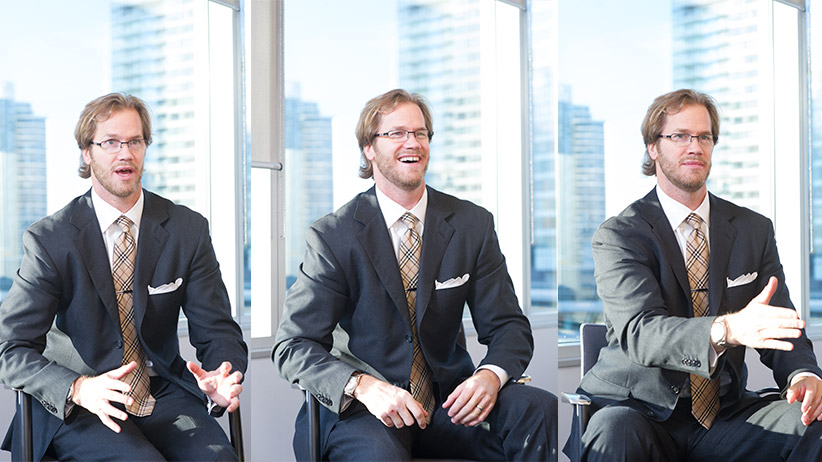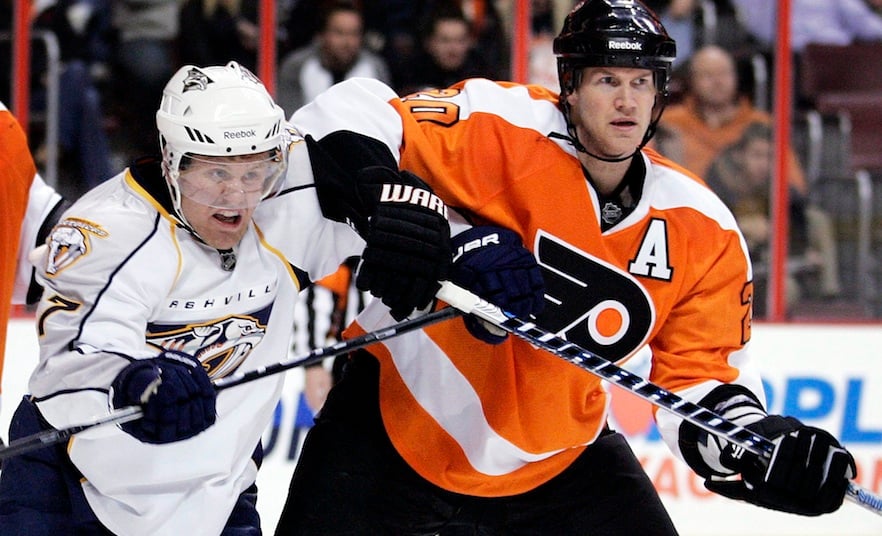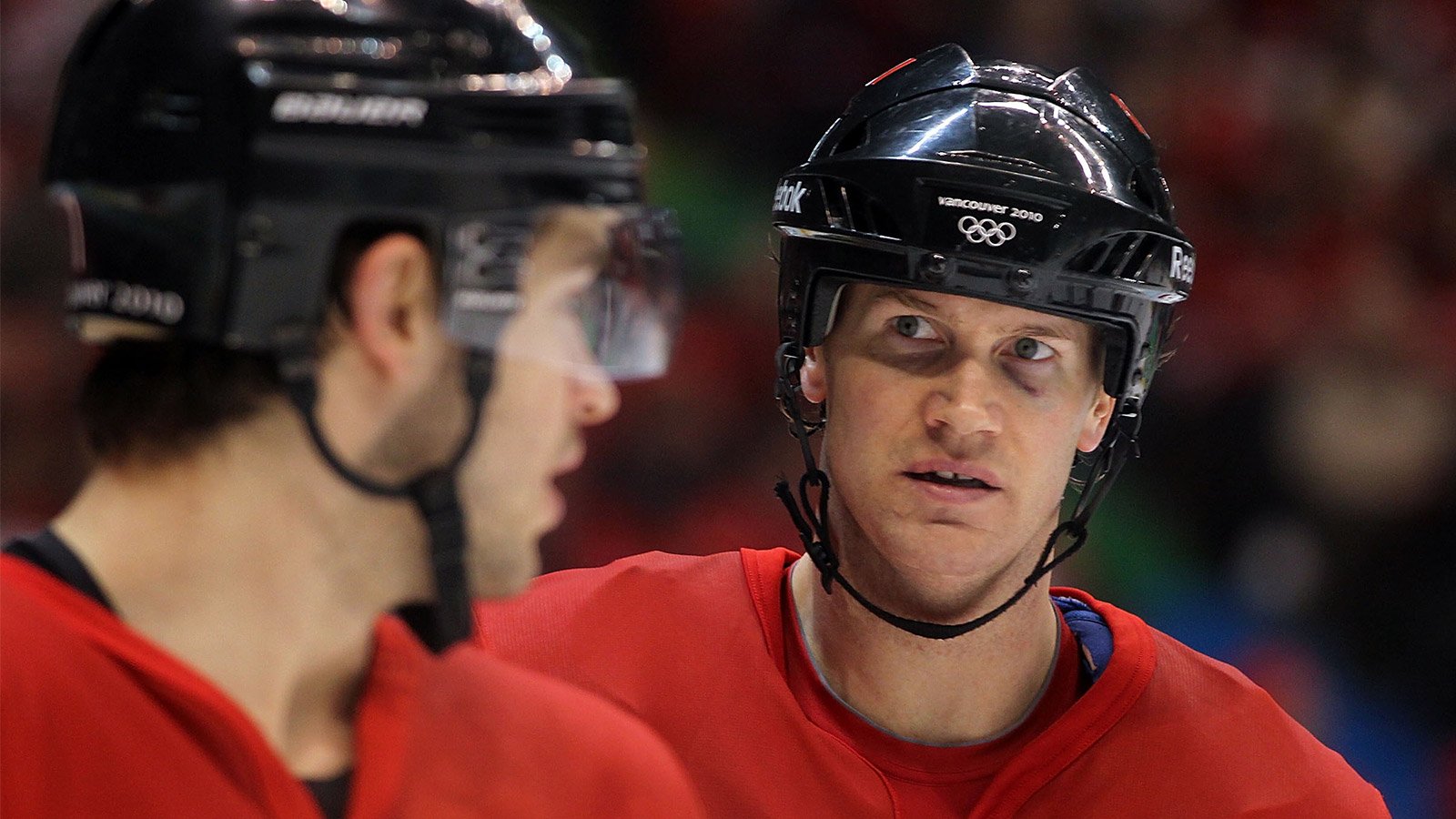The Interview: Chris Pronger on a new job and dark days
The defence great on the potential conflict of his new gig in the NHL’s department of player safety, and how his kids were his salvation as he dealt with injury
VANCOUVER, BC – FEBRUARY 23: Chris Pronger #20 of Canada looks on during the ice hockey Men’s Qualification Playoff game between Germany and Canada on day 12 of the Vancouver 2010 Winter Olympics at UBC Thunderbird Arena on February 23, 2010 in Vancouver, Canada. Jamie Squire/Getty Images
Share

Before post-concussion syndrome and a serious eye injury forced Chris Pronger to stop playing hockey three years ago, he’d won just about every prize that mattered—the Hart Trophy, league MVP, two Olympic golds plus a Stanley Cup. But the six-foot-six defenceman also kicked, elbowed and chopped his way to eight suspensions and 1,916 penalty minutes, making him a controversial addition to the NHL’s department of player safety last month. Technically, the 40-year-old Dryden, Ont., native is still a Philadelphia Flyer: he’s on the payroll until his contract expires in 2017, leading some to question his objectivity when judging players in the 16-team Eastern Conference.
Q: Why did you decide to take the job?
A: I wanted to stay in the game. It’s an important role, especially nowadays, given where injuries have gone. And I wanted to learn more about the league, what goes on behind the scenes. As a player, you don’t really think about that, nor do you really care: you’re worried about your job.
Q: Would you like to get involved at the management level one day?
A: Absolutely. You’re getting an opportunity to meet and speak with the GMs, assistant GMs, owners, governors—all the way up the line. It’s a great opportunity to understand the league a little better and the challenges it faces.
Q: Your size and strength made you one of the league’s best players. But you also developed a reputation for dirty play.
A: What? [Laughs]
Q: Can a dirty player be in charge of player safety?
A: You just called me dirty. I didn’t hear anyone else call me dirty . . .
Q: Right . . .
A: Look, I think playing the way I played, and knowing the game the way I know it, I think I’m going to have a better idea as to what the mindset of each player was.
Q: How so?
A: Mistakes happen. Not every one of my suspensions was purposeful or intentional. A lot of that stuff happens spur of the moment in the middle of a game. I think I can bring that to the table. Sometimes emotions get the best of you. Things happen.
Q: Okay. What doesn’t need to happen?
A: Knee-on-knee hits, avoidable injuries, checks to the head. Head hits are down in the league—but are they down enough? No. It’s a work in progress.
Q: Are you prepared to penalize players for playing your brand of hockey: tough, emotional, dirty?
A: That’s Stéphane’s role. [Stéphane Quintal is the senior vice-president of player safety.] I’m here to support him in making decisions, giving him feedback and answering any questions he may have: What would you have done in this situation? How would you have hit this guy? Do you think this guy took the right angle? But at the end of the day he’s the one doling out the punishment. I’m just a sounding board.

Q: You’re still on the Flyers’ payroll. Will your association colour your judgment when it comes to dealing with other Eastern Conference teams?
A: Not at all. I couldn’t care less who the teams are! I’m not involved in any Philadelphia-related game or situation. When people claim I’m going to have a “vendetta” against every other Eastern Conference team I don’t understand the logic: I’m not the one doling out the punishment.
Q: Will your own injury impact the way you view hits to the head?
A: No. Not at all. I wouldn’t change anything that happened. And I don’t see that being an issue. That’s the way the game was played when I was coming up. The game is different now. It’s just a by-product of the era.
Q: You mentioned the game had taken a new direction. Do you mean the head hits and concussions?
A: What I meant was the game has evolved. In the ’90s, when I started, it was still a rough-and-tumble, physical league. You take the hook and holding and a little bit of the physicality out of the game, and the speed ratcheted up two-fold. Now you have a split second to make a hit, or decide to pull up. When there’s indecision, you’re going to make a mistake. It’s not the game it was 20 years ago. But nor will today’s game be the same 20 years from now.
Q: Tell me a bit about the nuts and bolts of your job. Do you screen games from home?
A: Every day, I’ll get sent clips via email. I watch them and see if there’s something of substance or significance. Then Stéphane will send out an email with his thoughts. We go back and forth and discuss the play. Some nights are super busy; some nights are quiet.
Q: I feel like a player must know they can’t bulls–t you.
A: [Laughs] Yeah, you get a pretty good read by watching the play, and knowing what you would have done—having done most of the things that these guys are accused of doing. I put myself in their shoes: Would I have been wanting to send a message? Is it a hockey play that went a little sideways?
Q: Let’s talk about your recovery. Can you explain why you’re wearing glasses?
A: When I got hit I went from having 37-year-old eyes to having 65-year-old eyes. That’s why I’ve got the glasses on—so my eye isn’t constantly trying to focus and giving me headaches. But they also help me see better: my right eye is blurry.
Q: Having three little ones at home can’t be easy. They’re at such a loud, rambunctious age.
A: Early on it was pretty hard. I’d get irritated and aggravated pretty easily. That was tough on them. My wife would pull them aside and say: “Dad’s not feeling very good.” It’s difficult, at that age, to keep them to a “dull roar.”
Q: The game you loved was taken from you. How did you manage to stay afloat?
A: The first year I really didn’t do much. I didn’t go out. I just hung around at home. Those were dark days. But the second year was even tougher.
Q: How so?
A: I was feeling a little bit better, but I was watching the Flyers struggle, and feeling like I could have made a difference. That’s tough. I was still very invested in the team, very invested in how we were doing. I realized I needed to take a step back and start focusing on myself, my head and my eye, try to get my health back.
Q: A lot of guys in your position will turn to booze or to drugs to help them cope or ease the pain. Did you ever go down that road?
A: Yeah. I drank a little. But I was always at home with the kids, taking them somewhere.
Q: It sounds like your kids might have saved you.
A: Yeah. Exactly. It’s not like you can start pounding drinks when you’re wheeling your kids all over. They gave me something to shoot for, a goal to get back to.
 Q: But you were on the road to a dark place. How did you manage to get off?
Q: But you were on the road to a dark place. How did you manage to get off?
A: At one point I got sick of moping around, eating a lot of crap. I just didn’t feel very good. One day I woke up and I was like: “All right. I’m going to start eating right. I’m going to start working out.” I figured it might help me feel a little bit better—even if I was still sick, it might help me move forward with my struggles. I just kind of turned a corner.
Q: Where were you?
A: I was sitting at a friend’s place in Michigan on vacation, having a beer on the patio. I was a little hefty. I said to myself: “Okay, I’m going to finish this weekend off strong, then after that I’m going to shut her down. I’m going to start taking better care of myself.”
Q: What happens when you’re in a room with a lot of noise, commotion, bright lights?
A: I don’t like having noise swirling around me. Loud noises bother me, so I try to stick to the outside of a room. I try to keep the noise in front of me. I don’t like [it] when it’s behind me.
Q: Can you tell me what you’ve lost?
A: I used to have very good sixth sense—knowing exactly where someone was without seeing them. That hasn’t returned. You hope you can get back to 100 per cent. But it’s been three years. I don’t know if that is a viable goal.
Q: Do you ever push too hard?
A: My doctors say the more I continue to push, the more I can continue to raise that bar, the better I can get. That’s one of the reasons I wanted to do this job. It’s another opportunity to push myself, to challenge my brain. This summer I was trying to train a little harder, I was lifting a little bit more and trying a little bit more cardio and I had a large blow up.
Q: What happened?
A: I started to get a really bad headache and felt sick. It was bad. I was at a charity golf tournament. I told my partner I might need to go to hospital. I said: “I feel like I’m having an aneurysm right now.” My head was just pounding. When I got home I grabbed my wife’s hand and I put it on the back of my head. She said: “What is that?” I said, “That’s my headache.” She could feel it pounding through my head.
Q: You’re still young. Do you worry about what your life might look like in 15, 20 years?
A: Yes. But at the end of the day I’ve got to live my life. Bad things happen. I can’t be sitting here worrying about it.